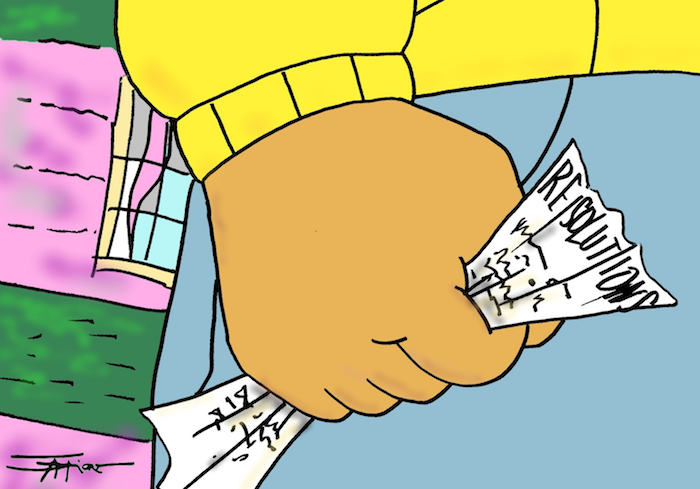“I’m just going to use it to get through finals, but during Christmas break I’m going to quit.”
This is how I explained my foolproof plan to abandon my Juul to my housemate at the end of last year. I do this with almost all the promises I make to myself; reaffirming a plan by relaying it to someone else feels like adding a layer of accountability. Pledges made in isolation feel worthless, and I end up motivating myself by setting iPhone alarms with labels that are both aggressive and self-deprecating. These are rarely effective, and most often I succeed only in wallowing in guilt and debauchery. The new year feels like a clean slate: An opportunity to commit oneself to reaching success with a flaring but fleeting determination. As we find ourselves at the beginning of the semester, it’s worth asking why resolutions are so difficult to maintain. Simply put, most of us struggle because we have have trouble understanding our own identity.
This explanation requires a brief interlude into the existential philosophy of Jean-Paul Sartre—bear with me—who began crafting his 683 page magnum opus Being and Nothingness after agonizing over how to motivate himself to go to the gym more. According to Sartre, consciousness is not something ‘in itself’; in other words, it is not a tangible thing that has definite characteristics. Human minds are constantly changing. There are quite literally infinite possibilities and choices that could shape your life, and we have an absolute freedom in commanding them. This alone is evidence of the indefinable character of consciousness. If we understand this, we understand that absolutism is incompatible with identity: Our conscious is too fluid for this kind of determination.
Mistakenly equating identity with the sum of our behaviours might explain why so many of us struggle in maintaining our resolutions. In behaving differently, we aspire to become someone else. As a result, we tend to recognize anything short of absolute success as failure. I struggle with this often. When I muff an attempt to improve my habits or my behaviour, it’s hard for me not to feel like I’ve been a bad person or failed myself. This is a common problem in resolution adherence. Sartre reminds us that these failures do not define us. While this notion should be comforting, accepting failure can be an assuaging prospect. Definitive failure is both disheartening and oddly relieving. When I accept my missteps as failures, I let myself forget some of the guilt and self-imposed pressure of a resolution. It’s easier to let our present actions define ourselves than to reaffirm our determination and remain on a path to betterment.
Inevitably, in my pursuit of an existence free of nicotine dependency, I have faltered and taken solace in a drunk cigarette or a piece of Nicorette. However, these errors remind me that my decision to try to quit does not determine my worth. I must decide to quit again and again to make it my reality. Many people who make resolutions view themselves as taking a stride across a spectrum from vice to virtue when what we should really be trying to do is achieve balance. This year, one of my resolutions is about resolutions themselves. I’m trying to think about my attempts at self-betterment as long-term, progressive projects that will, no doubt, include mistakes made along the way. Hopefully, letting go of the guilt and pressure associated with these endeavours will let me be more successful and content. So in 2019, be kinder to yourself. Recognize your missteps as obstacles to overcome, not immovable failures. Remain firm, resolute, and remember: The human consciousness is forever a work in progress.








